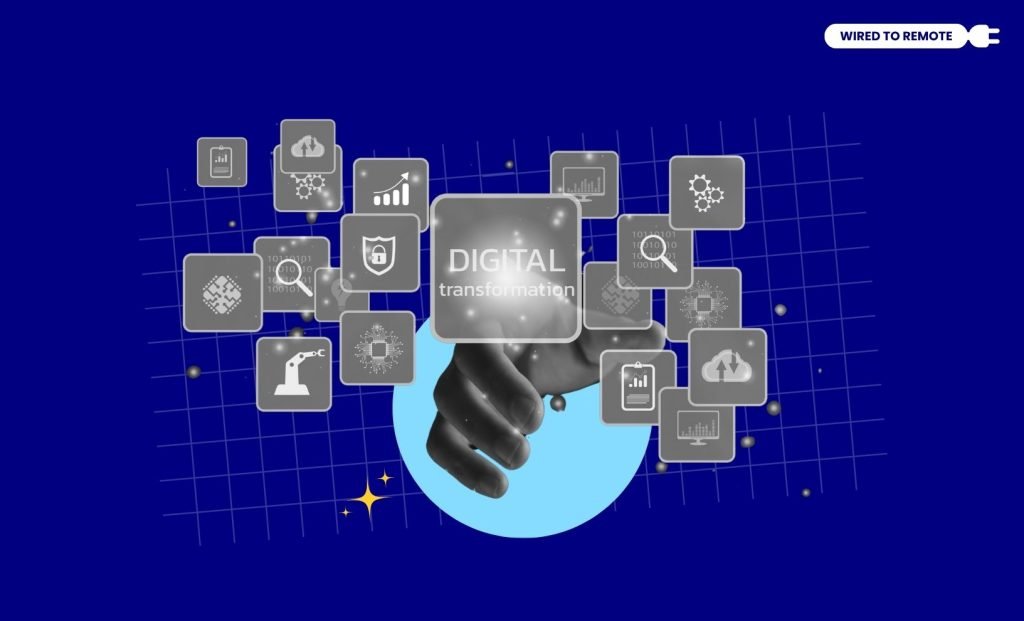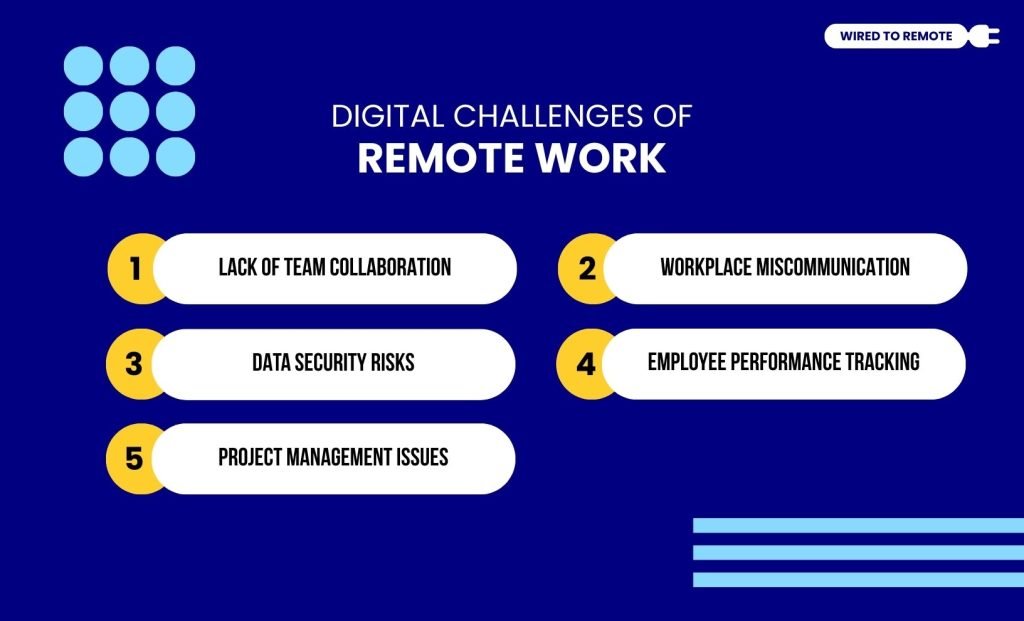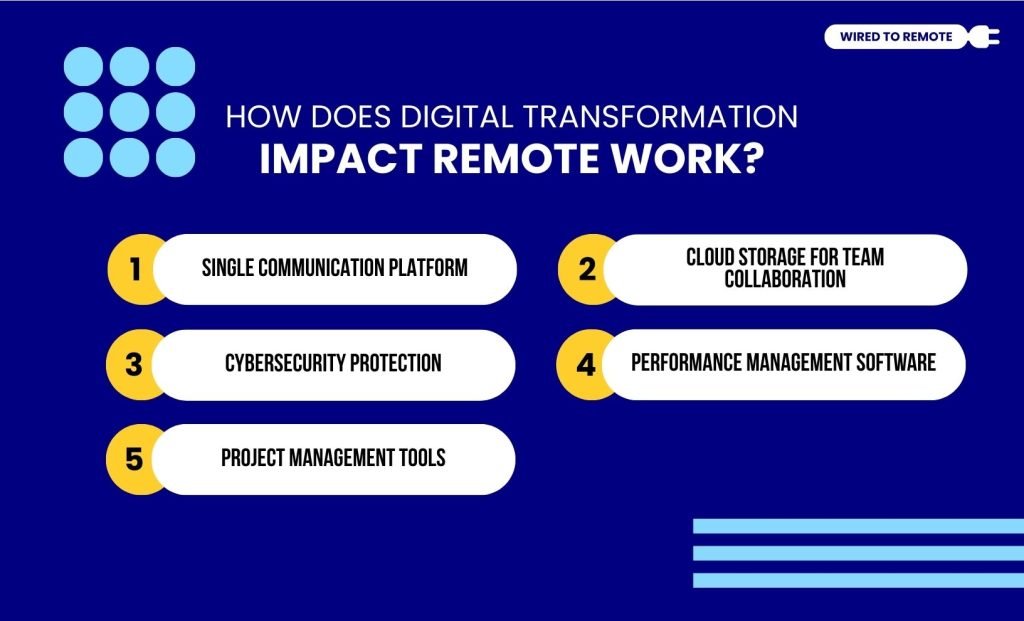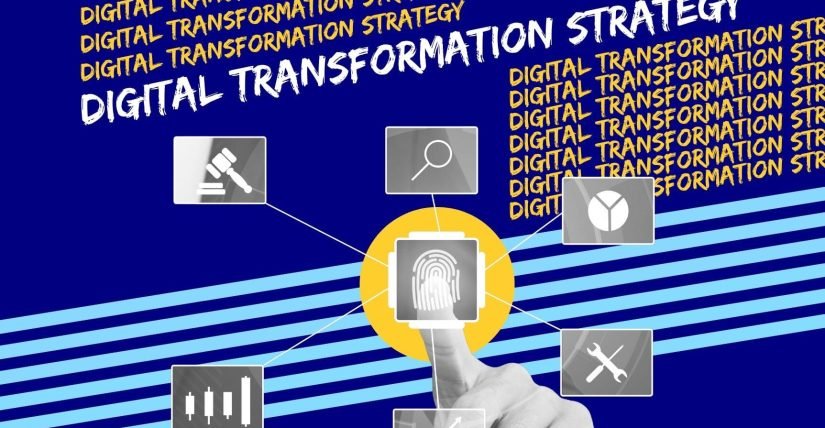- A digital transformation strategy is a comprehensive plan for using new technologies to improve the company’s operations.
- In remote work, it helps in addressing the digital challenges — Workplace Miscommunication, Team Collaboration, Project Management, and Data Security.
- By following a good strategy and incorporating the right digital tools, the remote company can streamline workflows and enhance work efficiency.
Remote work culture has massively evolved over the past decade, making 16 percent of global organizations shift from their in-office mode to a fully remote mode.
So, with a shift in work culture, unique digital challenges surfaced — communication breakdowns, collaboration issues, and lack of productivity.
And, the all-in-one solution to them is implementing a good digital transformation strategy.
Moreover, with the right strategy, you can smoothly transition from the office mode to remote mode. Eliminating these common challenges of remote culture.
In addition to this, a digital transformation strategy can help your organization to stay competitive in the industry. Leading to business growth and innovations.
So, if you are still wondering— “How does digital transformation impact remote organization?” Grab a seat.
Today, I am going to delve into the effectiveness of a digital transformation strategy in enhancing the remote culture by exploring —
- What it is,
- Its benefits and challenges,
- What role it plays in remote work,
- How to implement it, and more.
Stay tuned!
What Is A Digital Transformation Strategy?

In simple words, a digital transformation strategy refers to the comprehensive plan of integrating advanced technology within the firm to enhance its operations.
So, it focuses on shifting the company culture to a digitally advanced one.
Moreover, by adopting new technologies it enables the company to improve its workflows. Making them more adaptable, efficient, and customer-centric.
Why Does Remote Work Need A Digital Transformation Strategy?
Unlike regular work culture, remote work requires digital tools and equipment for its daily operations.
So, remote companies need to have digitally advanced technologies to ensure the workflow is streamlined.
Apart from this, a digital transformation strategy can benefit remote companies in—
- Ensuring effective communication across diversely located teams.
- Improving productivity and work efficiency.
- Providing high-quality cybersecurity and company data protection.
- Supporting the workplace evolution and aligning the goals of the workers.
- Fostering a positive and healthy work environment.
Pros And Cons Of Digital Transformation In Remote Work
| Pros | Cons |
|---|---|
| 1. Improved cross-team communication and collaboration. | 1. Issues with complete cybersecurity and data protection. |
| 2. Enhanced productivity and work efficiency. | 2. Skill gaps and training requirements with new technology adoption. |
| 3. Reduced operational costs. | 3. Over-dependence on technology. |
| 4. Streamlined workflow with better data analysis. | 4. Expensive investments in digital technologies. |
| 5. Enhances the scalability of the businesses. | 5. Too many digital tools can lead to digital overload for the workers. |
Digital Challenges Of Remote Work

Given that remote work completely relies on digital tools for performing daily tasks, remote workers face certain digital challenges. Preventing them from working efficiently.
Some of these digital challenges include:
- Lack Of Team Collaboration — With the team members located at diverse locations, it is difficult to ensure team collaboration. So, you need to provide digital tools and platforms that ensure diverse team collaboration.
- Workplace Miscommunication — Given that remote teams are not operating from an office, there are high chances of workplace miscommunication. So, to eliminate this possibility, you need to have advanced communication systems.
- Data Security Risks — Additionally, remote teams need to access company data from different locations, which can impact data security. So, you need to have advanced cybersecurity systems to protect data from breaches.
- Employee Performance Tracking — With the lack of physical monitoring of employee work, it is difficult to track the remote employees’ performance. So, you need to incorporate advanced digital performance tracking tools.
- Project Management Issues — With the entire team working from different locations, managing projects in a remote work culture is quite difficult.
So, you need to incorporate project management tools to assign tasks, manage timelines, and deliver tasks on time.
How Does Digital Transformation Impact Remote Work?

In a remote work culture, digital transformation helps eliminate these digital challenges effectively. So, here’s how you can leverage the advanced technologies to improve your work efficiency.
1. Single Communication Platform
To ensure that your remote team is able to communicate properly, you need to incorporate a single communication system.
Moreover, having a unified communication platform can help withreal-time information updates, screen sharing, video meetings, and instant texting.
So, some of the popular communication tools for remote work — Microsoft Teams, Google Workplace, Zoom, and Slack.
2. Cloud Storage For Team Collaboration
In addition to this, you can use a cloud storage system to store and share work documents and company data. This way, your team can access important documents when required.
Moreover, the cloud storage system can help with effective team collaboration. So, your employees can share and collaborate across different teams.
According to Statista, “Over 90 percent of organizations worldwide had implemented cloud technologies as of 2023, the highest adoption rate of any emerging technology”.
3. Cybersecurity Protection
Given that your sensitive company documents will be digitally accessed from diverse locations, you need to use advanced cybersecurity tools to keep your data protected.
So, some of the common protection methods include — Multifactor authentication, VPNs, and providing endpoint protection. This way, you can prevent data breaches and cyberthreats.
4. Performance Management Software
In addition to this, you can employ digital performance management tools that will help you to track your employees’ performances based on the KPIs.
Moreover, you can also use AI-powered tools to visualize their performance using interactive dashboards and real-time analytics.
So, some of the popular performance management software are — Lattice, Leapsome, HiBob, and PerformYard.
5. Project Management Tools
Along with these, the advanced AI-powered project management tools are great for tracking progress and delivering projects on time.
With these digital tools, you can easily break down complex projects into manageable tasks, set timelines, assign tasks, and monitor the progress.
So, you can choose from these popular ones — Asana, Trello, Jira, and Zoho Projects.
How To Implement A Digital Transformation Strategy In Remote Work?
Now that you have a clear idea of how you can employ digital technologies to transform your remote work culture, here’s how to implement a strategy:
- Access the current digital technologies used for daily operations.
- Identify the areas where you need to incorporate new technologies to improve the work culture.
- Choose the digital tools that address the issues and improve work efficiency.
- Create a road map to implement these tools by considering the challenges.
- Train your employees to enable them to handle the new technologies.
- Monitor how the new technologies are helping with the workflows.
- Adjust the plan based on the insights.
Things To Keep In Mind With Digital Transformation
With the shift to a remote work culture, digital transformation is the need of the hour. So, for a successful transformation, you need to have a good digital transformation strategy.
So, before you make a drastic digital transformation, just keep these few things in mind—
- Invest in the right technologies.
- Train your employees for the new technologies.
- Embrace automation to streamline processes.
So, by considering them, you can develop an effective strategy that helps your firm innovate and grow. Moreover, you will stay competitive in the industry.
So, go ahead and employ the right digital tools to elevate the remote work culture and unlock the potential of your workforce today!
FAQs
The four types of digital transformation are—
• Organizational transformation — transforming the company culture.
• Process transformation — optimizing the business processes to enhance efficiency.
• Model transformation — changing the workflow.
• Domain transformation — incorporating new technologies to improve operational efficiency with innovation.
To shift from in-office to remote work efficiently, you need to incorporate digital tools. These tools will help in creating a dedicated virtual workspace for the employees. So, they can perform their daily duties without facing any challenges.
By using a digital transformation strategy, you can improve communication gaps, team collaborations, productivity, workflows, and project management in remote work.
Moreover, it helps in eliminating the digital challenges with advanced technologies. So, remote workers get to work efficiently.





Leave A Comment